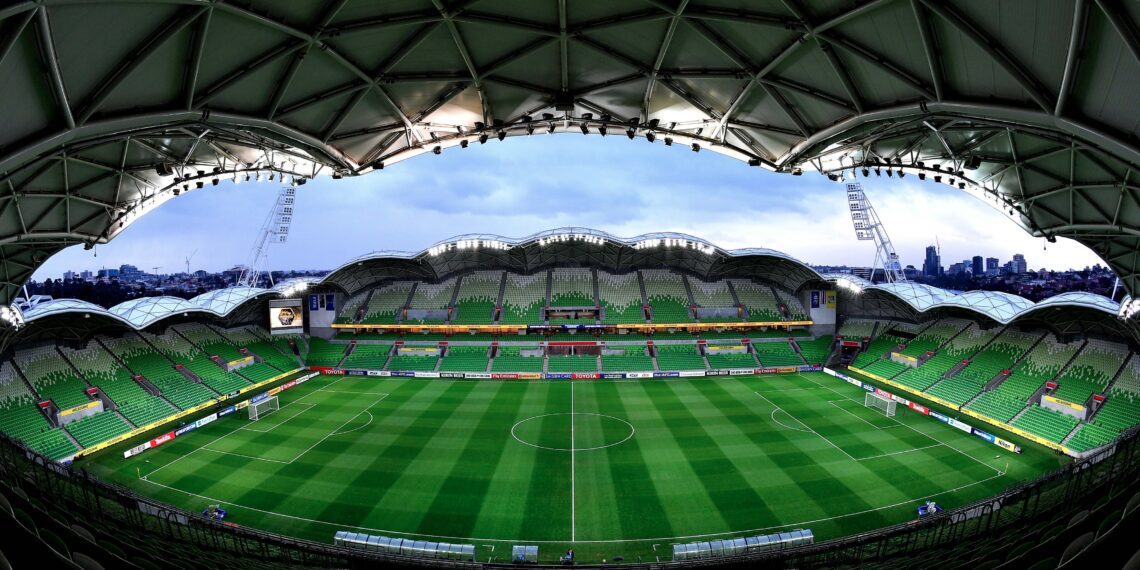The world is gearing up to witness the pinnacle of women’s football, the 2023 FIFA World Cup in Australia and New Zealand.
The global extravaganza promises to be a celebration of talents, determination, and the beautiful game itself.
While the event showcases the unrivalled skills of the teams, it is the majestic arenas that serve as the sacred battlegrounds where dreams will be forged and history written.
From iconic landmarks to state-of-the-art marvels, these great stadiums will thunder with the roars of passionate fans, creating unforgettable moments in this year’s World Cup.
Afrosport takes you through the captivating stadiums set to host the 2023 FIFA Women’s World Cup, where sporting prowess intertwines with architectural beauty, immersing us in a realm of pure football brilliance.
A record of 10 venues have been chosen to host the competition, with some truly special arenas set to showcase the best of the beautiful game.
Australia
Brisbane Stadium
Location: Brisbane, Queensland, Australia
Capacity: 56,851
Opened: 1934
With eight games set to be played at Brisbane Stadium, five of the matches will come during the group stage of the 2023 FIFA Women’s World Cup – including Australia’s match day two meeting with the Super Falcons of Nigeria and the Play-off for the third place match which will conclude the stadium’s three knockout fixtures. The Three Lionesses will kick off the stadium’s tournament against Haiti, before Brazil take on France on 29 July.
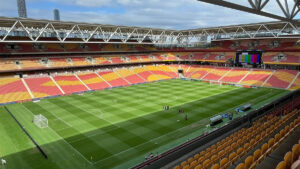
On match day three of Group B, Nigeria will make their return to Brisbane to go head-to-head with the Republic of Ireland. Meanwhile, in Group H, two-time champions Germany will lock horns with Korea Republic. The bustling stadium will not only witness these thrilling group stage encounters but also host an intense Round of 16 clash and a captivating quarter-final match.
Hindmarsh Stadium
Location: Hindmarsh, Adelaide, Australia
Capacity: 13,327
Opened: 1960
Adelaide’s Hindmarsh Stadium will be hosting a total of five matches throughout the tournament. These games will span across four gripping group-stage encounters and lead up to a captivating knockout round match.
Kicking off the stadium’s lineup is the clash between Brazil and Women’s World Cup newcomers Panama in Group F on 24 July. Four days later, the anticipation mounts as Haiti, another first-time participant, takes on China PR.

Continuing the stadium’s showcase of fresh talent, Morocco, also making their tournament debut, will face Korea Republic on 30 July. The excitement reaches its pinnacle on 1 August when China PR, the reigning Asian champions, square off against European champions England in an epic showdown from Group D.
As the grand finale, the arena’s crowning moment will be the round of 16 encounter between the winners of Group F and the runners-up of Group H, taking place on 8 August.
Melbourne Rectangular Stadium
Location: Melbourne, Victoria, Australia
Capacity: 28,870
Opened: 2010
The stadium’s journey will commence with the opening-day clash between Nigeria and Canada. Group H action will follow, as two-time champions Germany face off against Morocco just three days later, creating a spectacle not to be missed.
On 2 August, the stadium will witness the thrilling showdown between Jamaica and Brazil, marking the final group-stage encounter at this prestigious venue.

The excitement intensifies as Melbourne Rectangular Stadium hosts two Round-of-16 matches. Melbourne Rectangular Stadium is poised to offer an unforgettable stage for these decisive matches, where teams will battle fiercely to secure their place in the next phase of the Women’s World Cup.
Perth Rectangular Stadium
Location: Perth, Western Australia, Australia
Capacity: 13,932
Opened: 1910
The tournament’s opening act at this iconic venue will showcase the Group D showdown between Denmark and the reigning Asian champions, China PR, setting the stage for intense competition.
Throughout the group phase, Perth Rectangular Stadium will welcome a total of four Women’s World Cup debutants. The thrilling journey commences with Republic of Ireland, who will face off against the formidable Olympic gold medalists, Canada, in Group B on 26 July.
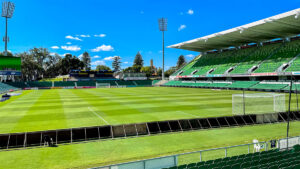
Three days later, the stadium will witness the clash between two emerging forces as Panama takes on Jamaica, adding another layer of excitement to the tournament. On 1 August, the spotlight will shine on Haiti, locking horns with Denmark in a match brimming with anticipation.
The grand finale of the stadium’s group-stage extravaganza will be marked by Morocco’s encounter with Colombia on 3 August, as the quartet of newbies leave an indelible mark on the competition.
Stadium Australia
Location: Sydney, New South Wales, Australia
Capacity: 69,314
Opened: 1999
Stadium Australia, a monumental arena, has been chosen to host the inaugural match of the 2023 FIFA Women’s World Cup, where the nation’s beloved Matildas will fiercely compete against Republic of Ireland in Group B. As the competition reaches its climactic stages, this colossal venue will also host three captivating knockout matches.
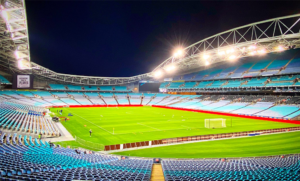
On 7 August, the winner of Group B will face off against the runners-up from Group D in a thrilling last-16 encounter, igniting the stadium with unyielding passion. Five days later, the venue will witness the fourth and final quarter-final, raising the stakes even higher as teams vie for a coveted spot in the tournament’s elite stages.
Anticipation will continue to mount as the second semi-final unfolds at Stadium Australia on 16 August, ultimately determining the participants of both the final showdown and the gripping third-place play-off.
Sydney Football Stadium
Location: Sydney, New South Wales, Australia
Capacity: 38,841
Opened: 2022
Six remarkable series of games will commence with the captivating opening clash between France and Jamaica in Group F on 23 July.
Throughout the tournament, Sydney Football Stadium will be graced by the presence of Colombia, who will make two appearances in Group H, facing off against Korea Republic and Germany.
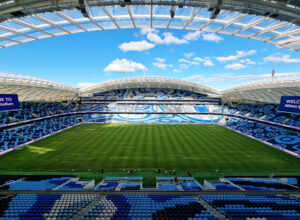
In between those matches, European champions England will engage in a Group D clash against Denmark, adding to the stadium’s allure.
As the tournament intensifies, the stadium’s final game will be a last-16 clash on 6 August. This encounter will witness the clash between the group winners of Group E and the nation that secures the runners-up position in Group G, guaranteeing an adrenaline-fueled battle for advancement in the knockout stage.
New Zealand
Dunedin Stadium
Location: Dunedin, Otago, New Zealand
Capacity: 24,243
Opened: 2011
The magnificent Dunedin Stadium is set to host six group-stage matches during the Australia & New Zealand 2023™ tournament.
The opening day at Dunedin Stadium will witness an exciting clash in Group A between Philippines and Switzerland, as both teams vie for an early advantage. The Swiss team will return to the venue on the final matchday of the group stage, facing co-hosts New Zealand on 30 July in a thrilling showdown.

Dunedin Stadium will also welcome the Netherlands for two of their Group E encounters. The Dutch team will take on Portugal on 23 July, setting the stage for a clash of titans. Additionally, the Netherlands will face Vietnam on 1 August.
On 26 July, Japan will enter the battleground at Dunedin Stadium, ready for Costa Rica. Two days later, the stadium will witness Argentina and South Africa do battle.
Eden Park
Location: Kingsland, Auckland, New Zealand
Capacity: 40,536
Opened: 1900
Auckland’s iconic Eden Park will serve as the prestigious venue for the opening game of the 2023 FIFA Women’s World Cup, featuring a compelling clash between New Zealand and Norway. In addition to this historic encounter, Eden Park will host five other gripping group matches and three knockout ties.
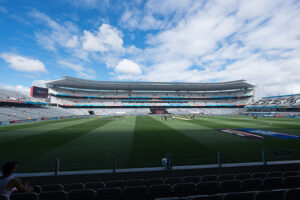
The renowned stadium will also be the stage for two of the USA’s group-stage matches, as the USWNT under the guidance of Vlatko Andonovski aim to make history by becoming the first team, male or female, to secure three consecutive FIFA World Cup™ titles.
Eden Park will set the scene for the first knockout stage match of the tournament, marking the commencement of the last-16 action.
As the competition progresses, the city’s premier football stadium will further captivate fans by hosting a quarter-final and a semi-final, bringing us closer to the thrilling climax where the world champions will be crowned and the trophy will find its rightful home.
Waikato Stadium
Location: Hamilton, New Zealand
Capacity: 16,271
Opened: 2002
The tournament kicks off at this remarkable venue with the captivating Group C clash between Zambia and the former champions Japan, setting the stage for intense encounter.
On 25 July, another former champion, Norway, takes the field against Group A rivals Switzerland. Two days later, the stadium will get set for another battle between Portugal and Vietnam in Group E, further adding to the tournament’s drama.

Zambia will return to Waikato Stadium for the final matchday, facing off against Costa Rica, while Group G concludes the venue’s hosting duties with an exciting clash between Argentina and Sweden on 2 August.
Wellington Regional Stadium
Location: Wellington, New Zealand
Capacity: 31,089
Opened: 2000
The Wellington Regional Stadium will host a total of nine matches at the upcoming 2023 FIFA Women’s World Cup, providing a platform for beautiful football moments. On 21 July, the stadium will be filled with excitement as Spain take on Costa Rica to mark the beginning of Wellington’s hosting duties.

The lineup also includes New Zealand’s clash with the Philippines, as well as a highly anticipated rematch of the 2019 final between USA and the Netherlands.
Later in the group stage, Spain will return to the venue for a thrilling showdown against Japan, concluding Group C’s battles. Group G will feature an intense encounter between Sweden and reigning African champions South Africa on 23 July. Both nations will then return to Wellington Regional Stadium to face Italy on 29 July and 2 August, respectively.

